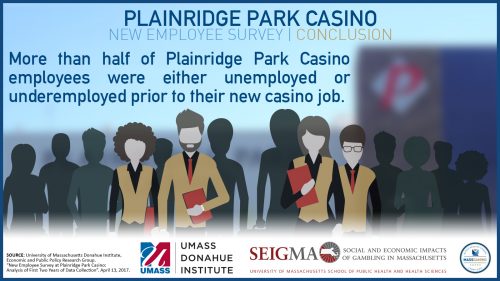Research Agenda: Plainridge Park Casino Employee Survey Results Released
- May 10, 2017
- by MGC Communications
- 0 comments
HADLEY – The UMass Donahue Institute released a compilation of results from two years of new employee questionnaires at the Plainridge Park Casino. This report is the latest in a series of studies focused on the economic impacts of the gaming industry in the Commonwealth. Representatives from the UMass Donahue Institute presented its findings to the Massachusetts Gaming Commission during a public meeting on May 10, 2017.
The findings reveal several important characteristics of new hires at Plainridge Park Casino and the emergent casino workforce in Massachusetts:
- 50.1 percent of new hires worked part-time or were unemployed before obtaining their job at Plainridge Park Casino.
- Major reasons for seeking employment included career advancement, improved pay, and improved benefits.
- 40.1 percent of new hires said they needed work due to being unemployed, part-time or underemployed. 86.2 percent had no gaming experience prior to their jobs at Plainridge Park Casino.
- 96.5 percent of new hires did not transfer from other Penn National Gaming locations; and 92.8 percent did not move to take their jobs at the casino. Of those who moved, one quarter originated from cities or towns within Massachusetts.
- Nearly three-quarters of respondents come to their job without pre-employment training for their position.
The vast majority of survey respondents are people who are new to the gaming industry and are now being hired for gaming and non-gaming positions at Plainridge Park Casino, including its food court vendors. Very few workers (only seven percent) moved to take their job at Plainridge Park Casino and those who did were mostly from Massachusetts and Rhode Island. This suggests that most new employees live close enough to commute to their positions at Plainridge Park Casino.
MGC Chairman Steve Crosby said, “As we have pointed out repeatedly, the Legislature made broad-based economic development a key focus of the Gaming Act, with a particular focus on local employment for those underemployed and unemployed.” Chairman Crosby added, “This report, thus far, demonstrates that legislative intent is being achieved. We are also pleased to see the implementation of the legislative mandate to objectively and rigorously assess the economic and social impacts of gaming. This report represents one of the many important research topics fulfilling that objective.”
“One of the most important positive impacts of expanded gambling is increased employment,” said Rachel Volberg, Principal Investigator of the SEIGMA (Social and Economic Impacts of Gambling in Massachusetts) group. “However, in assessing the overall impacts of expanded gambling, it is important to understand whether employment gains at the casino result in the loss of employment in other sectors of the economy and in surrounding communities. This report establishes a basis for making this determination going forward and will help us understand the role of casinos in increasing economic activity (and overall employment) in Massachusetts.”
The on-going SEIGMA group, of which the Economic and Public Policy Research (EPPR) team at the UMass Donahue Institute is a part, strives to understand the impacts of the introduction of casinos on the people and economy of the Commonwealth. Of interest in this endeavor is a better understanding of new employment opportunities offered by casino operators and characteristics of the workforce at point of hire. To this end, a survey was designed to gather a range of information on work-related characteristics and aspirations of new employees.
“As our research continues to move forward, we will further refine and expand our data collection around casino employees to better understand issues of professional experience, training needs, and job turnover. This information will be critical in understanding the economic impacts of casino workers, as well as ideally helping plan training around casino employment opportunities,” said Mark Melnik, Director of UMass Donahue Institute’s EPPR group.
The UMass Donahue Institute is a member of the Social and Economic Impacts of Gambling in Massachusetts (SEIGMA) project team that has been charged with carrying out the research agenda of the Massachusetts Gaming Commission.
The University of Massachusetts Donahue Institute is the public service, outreach, and economic development group of the University of Massachusetts President’s Office. Established in 1971, the Institute strives to connect the Commonwealth with the resources of the University, bridging theory and innovation with real world public and private sector applications. For more information, www.donahue.umassp.edu.
CONTACT: Ken LeBlond, Marketing Communications Manager, UMass Donahue Institute, kleblond@donahue.umassp.edu, (413) 545-3452.
CONTACT: Elaine Driscoll, Director of Communications, Mass Gaming Commission, elaine.driscoll@state.ma.us, (617) 571-2964.

